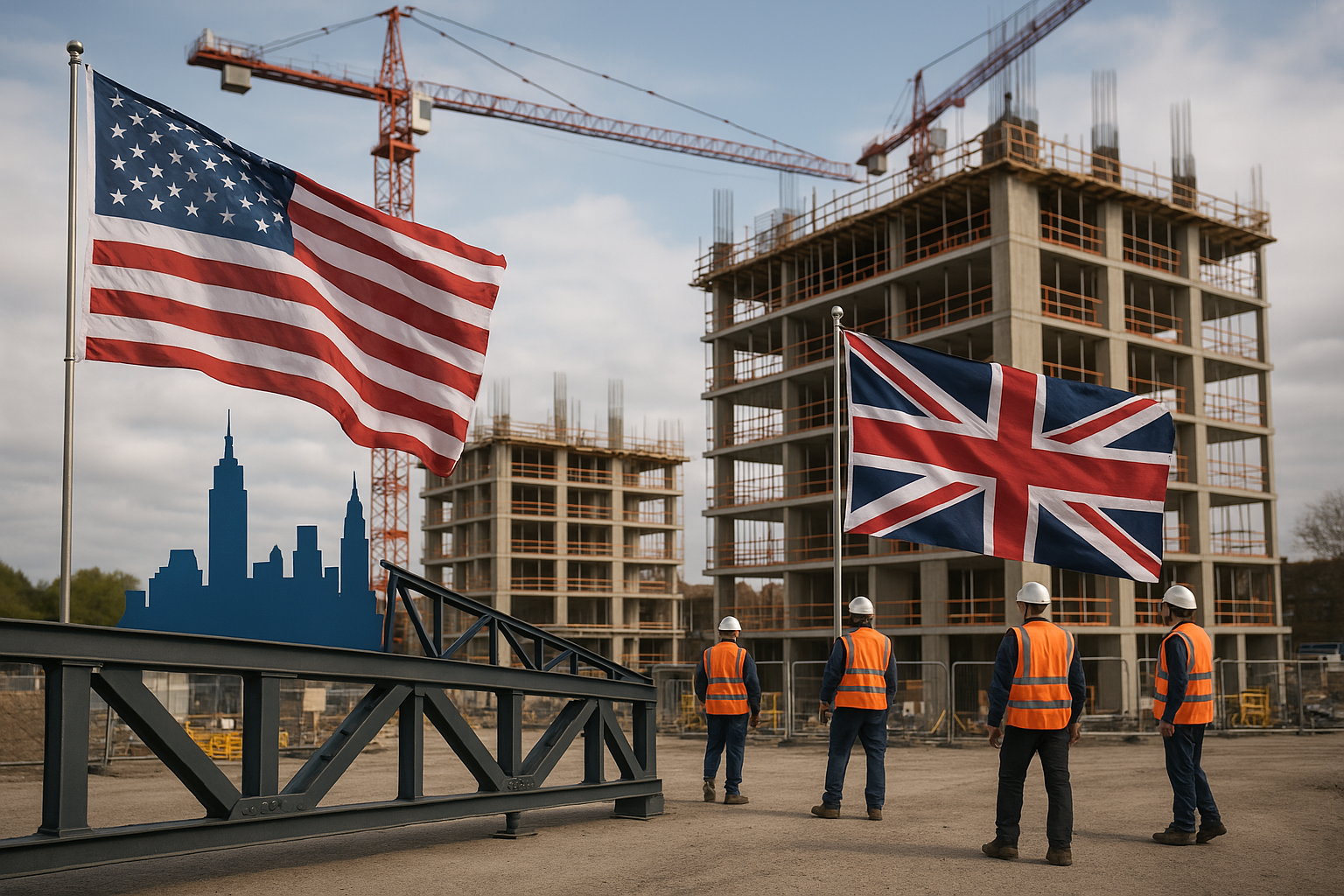
Tariffs, Tensions and Trade Wars: Guide For Construction Marketers
Trump's latest tariffs have landed, and if your construction business trades with the United States, you already feel the hit. A new 10 percent baseline tariff is affecting nearly all UK exports to the US, while steel, aluminum and certain automotive parts face a steep 25 percent rate. This is not just a mild inconvenience. It is a reality check. If you are in construction and you export or plan to export, your product's price and perceived value just changed.
At ScopeLabs, we understand the construction industry is complex enough. Now you have to add global trade politics to your risk management list. The question is simple. How do you respond?
We believe you respond by telling a stronger story. By clarifying your worth, pivoting your marketing strategies and staying agile in how you engage customers, both in the UK and across the Atlantic. In the sections below, we will unpack what the tariffs actually mean for UK construction firms. We will also share ideas on how to protect revenue, maintain long-term momentum and keep customers close when the economics change overnight. Ready to dive in?
Why These Tariffs Matter So Much
When a tariff of 10 percent or even 25 percent gets tacked onto your goods, you might think of it as a tax that makes your product less competitive in the US. A new total cost that US buyers have to bear. The result is often a shift in buyer behavior, which can affect everything from the quantity of leads you generate to the tone of conversations your sales team has on the ground.
Small and medium construction businesses can feel this impact more acutely than large corporations. If you are an SME specialising in prefabricated concrete panels, structural steel, specialist cladding or high-end construction materials, the margin you have to play with is already tight. Suddenly, your US buyer is paying a premium that might push them to look for alternatives. Or at the very least, challenge you more aggressively on pricing.
The Federation of Small Businesses warned that these tariffs could "cause untold damage" to UK companies trying to stay profitable or expand in the US market. For construction, it is about more than just a dip in sales. It is about survival in a competitive space where cost, reliability and trust all factor heavily into the buying decision.
Shifting Focus from Price to Value
Your old marketing playbook might have leaned on cost-competitiveness. You might have sold yourself as the more affordable or faster solution compared to US-based suppliers. That angle works when tariffs are low or non-existent. Now, that is not the case.
To adapt, construction firms need to elevate the conversation. Instead of focusing on being cheaper, highlight the real advantages: quality, sustainability, technical expertise, reliability and the unique stories behind your materials and processes. US clients still value top-grade craftsmanship and reliability, especially in large-scale commercial or infrastructure projects. They will still buy from UK suppliers if they see a clear payoff.
Speak to a Deeper Set of Benefits
-
Technical Edge. Are your structural steel components tested to higher British or EU standards? Communicate that.
-
Sustainability. If your brand invests in low-carbon concrete mixtures or reduced-waste production processes, let that lead the conversation.
-
Warranty and Support. Show how you stand behind your work. Maybe you offer extended support or easy returns for faulty materials.
-
Heritage and Expertise. The UK is known for engineering excellence. Position your brand as part of that tradition.
With this approach, you acknowledge that your cost might be higher than a US-based supplier. However, you also position your solution as worth every penny.
Communicate Openly and Early
Tariffs can trigger immediate questions from your US buyers. They want to know why your prices just jumped, or whether you will pass on some of the burden. Do not leave them guessing. Clear, honest communication builds trust.
Action Steps
-
Pricing FAQs. Create a short webpage, PDF or email series addressing potential tariff-related questions. Explain what changed, how it impacts costs and what you are doing to minimse the effect on your clients.
-
Sales Deck Updates. Empower your sales reps and account managers with new talking points, negotiation tips and technical data. They need to show that your firm has a plan.
-
Transparent Discussions. Talk to key clients before they even ask. If you have long-term contracts, let them know how you intend to honor existing terms or negotiate new deals. That pre-emptive approach goes a long way toward maintaining trust.
Double Down on Digital
Construction marketing still sometimes hinges on in-person visits, trade shows or large-scale demonstrations. But tariffs mostly target physical goods. Your ability to tell the story digitally remains untaxed and unhindered. Digital channels let you keep your brand top-of-mind for US clients, even if supply chain or cost challenges make immediate sales more complicated.
Ideas to Consider
-
Virtual Demos and Webinars. Host live sessions demonstrating your products' performance. This adds transparency that helps justify higher costs.
-
Thought Leadership. Create blog posts, LinkedIn articles and videos that tackle relevant construction topics, such as advanced steel reinforcement methods or sustainable building practices. A well-informed client may value your expertise more than a cheaper competitor.
-
Targeted Paid Ads. If certain US regions are more open to premium imports, direct your paid ads there. For instance, major coastal cities or states with robust green-building initiatives might be more receptive to paying a premium for quality or sustainability.
This approach is about forging deeper relationships and brand recall. When clients eventually must buy from overseas, they will remember the UK firm that provided them with valuable insights and a consistent, professional online presence.
Localise or Partner Where It Makes Sense
Sometimes, the easiest way to deal with tariffs is to reduce their impact altogether. If you see your firm expanding more deeply into the US market, consider setting up a local presence or collaborating with US-based partners. This could mean renting a warehouse in the States or partnering with a local distributor to handle part of the supply chain.
Localisation is not a fit for every business. However, if the US is critical to your growth, investing in a presence there could sidestep some tariffs and reassure buyers who worry about cross-border shipping times, customs complexity or sudden price hikes.
Potential Benefits of Local Partnerships
-
Faster Delivery. Local warehousing means your products can reach US projects quickly.
-
Reduced Tariff Exposure. Certain assembly or finishing steps completed in the US might change the classification of your product and reduce tariff rates.
-
Shared Marketing Opportunities. A US partner might open doors to new networks, events and deals that you would not access otherwise.
Reinforce Your Reputation
Construction buyers care about credibility. If you have built your business on trust and reliable delivery, a tariff will not automatically destroy your relationships. You just need to communicate that you are still the same dependable partner. Your marketing can do a lot to back that up.
Reputation-Boosting Tactics
- Case Studies of Resilience. Show how your firm has navigated volatile times before. Maybe you delivered essential steel reinforcements during a supply chain crunch. Tell that story.
- Independent Accreditations and Certifications. If your processes are ISO-compliant or recognised by industry bodies, display this prominently in your marketing. These badges speak volumes.
- Client Testimonials. Let real project managers or procurement teams in the US talk about why they keep working with you, even if the price has gone up.
The ScopeLabs Approach: Partnership Over Panic
At ScopeLabs, we specialise in helping sustainable construction businesses find clarity in complexity. If these new tariffs have rattled your plans to break into or expand in the US, we want to help you turn that disruption into a strategic advantage.
Our brand story is all about building better. We come at marketing from a place of boldness and honesty. No filler and no empty promises. In the construction world, we see a lot of half-baked marketing. Stock photos of hard hats and skyscrapers and not much else. That will not cut it when you are asking US clients to pay 10 or 25 percent more. You need a narrative that shows the deeper worth of your offering.
We can help you:
- Identify the right market segments to prioritise in the US
- Develop value propositions that speak to sustainability, reliability and expert engineering
- Train your sales teams with on-point messaging, negotiation frameworks and content that closes deals
- Create digital campaigns that generate leads where your target customers really live and work
- Explore operational tweaks that might reduce tariff pressure, from partial assembly in the US to forging local partnerships
Ultimately, we see tariffs as a nudge to step up your marketing approach. The winners in this scenario are the ones who can reframe "higher cost" as "higher value."
Real-World Results
Consider a UK-based modular construction firm exporting custom pre-fab units to the US. Following the tariff hike, they faced a 20 percent jump in total landed costs. Instead of dropping prices or halting exports, they:
-
Shifted messaging away from "competitive pricing" to "premium workmanship, proven speed on-site and minimal waste."
-
Created a digital knowledge hub for US clients, with in-depth resources, 3D renderings and a transparent FAQ on tariff implications.
-
Partnered with a US-based logistics firm to store inventory in a Texas warehouse, which shortened lead times and offered local customer support.
-
Ran LinkedIn campaigns targeting developers who care about green building and who place a premium on speed, safety and low-impact construction.
Yes, they sold at a higher price. But they also engaged buyers who saw the bigger picture. This firm continued to grow in the US market, precisely because they tackled the tariff conversation head-on and built a new value story around it.
Push Through the Noise
Tariffs are disruptive, frustrating and potentially expensive. They force you to rethink your usual marketing spiel, which may be exhausting if you already have a hundred items on your agenda. Yet this is also an opening to refine, reshape and realign your strategy in a way that pays dividends long after the trade war headlines fade.
ScopeLabs is here to help you make that shift with clarity and conviction. We are not about short-term gimmicks or a one-size-fits-all approach. We focus on telling the real story of your construction brand. And right now, that story should highlight not just how you operate, but why you operate, and why you are worth every dollar in the new tariff-laden landscape.
If you are ready to transform what feels like a setback into a springboard for long-term momentum, let's talk. Construction might be full of twists and turns, but you have something valuable. Let us help you show it.
